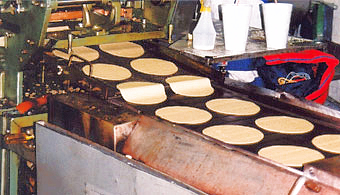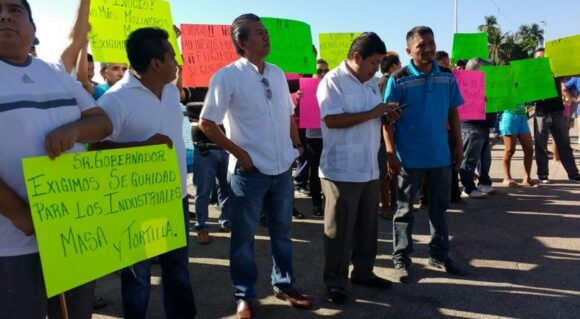In 2014 there were 285 tortillerias in Chilpancingo, the capital of the state of Guerrero, when the troubles with the drug cartels really started. Now only 185 remain open as a result of drug gangs attacking the tortilla shops and workers, kidnapping owners and forcing others out of business out of fear of the violence.
Chilpancingo, with a population of over 280,000, is situated in the mountains 105 km north-east of Acapulco. As elsewhere, the tortilla shops are concentrated in the poorer barrios where local criminal gangs also tend to be located. Tortillas are sold from small shops with a view to the street, or are delivered door-to-door by young men on motor cycles.
The drug cartels in Chilpancingo, such as Los Rojos and Guerreros Unidos, realized that by controlling the business owners and the employees of tortillerias, they would have a wide-spread and well-placed network of drug distribution points, lookouts and street dealers, operating under the guise of these many small legitimate businesses.
The take-over began in 2014 with the kidnapping of shop owners and workers, often involving a week’s captivity in a secure house, and demands for ransom ranging from 30,000 pesos (US$2100), up to 2 million pesos (US$140,000 for owners of multiple tortillerias.) After release, the victims were forced to co-operate with the cartel’s drug distribution and look-out system, under threat of business closure. The leader of the Chilpancingo tortilla sellers, Abdon Abel Hernandez has been threatened numerous times, kidnapped once, and his family had to borrow a million pesos to secure his release. He says about 35% of the local tortilla industry has shut down since 2014 out of fear.
The regional president of Corpamex (Mexican Confederation of Business Owners) Adrian Alarcon says he also lives with the fear of death for trying to defend his threatened union membership. “Today the tortilla industry is kidnapped by them (criminal groups) just like what happened with public transport when they forced taxi drivers and bus drivers to become the hands and eyes of the narco. The industry is completely infiltrated. The money that comes from the tortillas is used to buy weapons. We are financing them”.
He also stated that 36 businessmen were kidnapped and tortured in the central region of Guerrero in the first two months of 2016, with most of the victims being associated with the tortilla industry. “It wasn’t a coincidence”, he said, “that a national survey named Chilpancingo as the country’s worst city to live in. Crime has put an end to everything: investments, jobs, and the desire to make a family here. But if you think the situation here is in a critical state, you should go to Acapulco. Here, the tortilleros are kidnapped, but there they are being killed.” According to Arcadio Castro, leader of the Tortilla Association of Guerrero, 20 tortilla workers lost their lives in 2015 in clashes with organized crime.
The previous chief of police of Acapulco was dismissed after he failed to pass control examinations, known as trust tests, designed to identify those with possible links to organized crime. His replacement expects some 700 of his current force of 1901 municipal police will also fail their next control exams. Given his current budget, he has no hope of renovating his police force with younger, healthier, law-abiding officers. The assault on the tortilla industry is generally not felt in the tourist areas of the city.
In 2010 UNESCO included the traditional Mexican cuisine of Michoacán in its list of the Intangible Cultural Heritage of Humanity, in large part based on the multiple uses and cultural centrality of corn in Mexican traditional cooking. This decision was very publicly celebrated by the tortilla industry. Unhappily, today, the tortillerias of Guerrero are struggling to survive the extortion rackets of the local drug cartels.
Main source:
Oscar Balderas. Drug Cartels Are Taking Over the Tortilla Business in Mexico. VICE News, , 16 March 2016; article re-published in Business Insider.
Related posts:
- Food speculation fuels a tortilla crisis in Mexico
- Is this the beginning of the end for blue corn tortillas? (Mar 2011)
- Preserving genetic diversity of Mexico’s corn essential for world food security
- Reducing pollution from the making of corn tortillas (Mar 2010)
- Eco-tortillas: an environmentally friendly way to make Mexico’s staple food (Feb 2012)
- The geography of Mexican cuisine
One Response to “Drug cartels taking over the tortilla industry in Guerrero”
Sorry, the comment form is closed at this time.


Extremely sad. In Santa Catarina a suburb of Monterrey almost if not all of the retail sellers of beer and all the bars have “handed over” their businesses to “new owners”. Those who were too slow were killed or had employees and customers killed. It was actually a small number of people murdered in total, the message was loud and clear. Among the victims were two 17 year old prep school students who were in a corner shop playing on a pin ball machine.
COPARMEX Confederación Patronal de la República Mexicana
http://www.coparmex.org.mx/